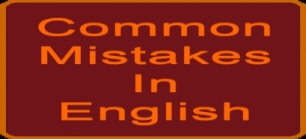
   |
[Essay/영작] (CM-099) "Small, Big for Young, Old", "High for Tall", "Sick or Ill"
최고관리자 | 19-08-06 22:30

419. Small, Big for Young, Old
(X) I'm two years smaller than you. / She's three years bigger than me.
(O) I'm two years younger than you. / She's three years older than me.
If reference is to "age", say "young or old". "Small and big" usually refer to "size".
He is big (or small) for his age
Note: "Great" refers to the "importance" of a person or thing.
eg) Napoleon was a great man. / Homer's Iliad is a great book.
Use great with words like distance, height, length, depth.
eg) There is a great distance between fhe earth and the moon.
Informally, use "great" to mean something "nice or good".
eg) We watched a great concert last night.
420. High for Tall
(X) My elder brother is six feet high.
(O) My elder brother is six feet tall.
We generally use "tall with people", and it's the opposite of short.
Use "high" when referring to trees, buildings, or mountains, and it's the opposite of low.
421. Sick or Ill
(X) He's been sick for over a year.
(O) He's been ill for over a year.
To be "ill" means to "be in bad health". To be "sick" means to "vomit".
We sometimes use sick idiomatically to mean feeling ill: The smell made me sick.
Note: We can also use sick before certain nouns.
The sick room(= sickroom), a sick note, sick leave.
We use the plural noun "the sick" to mean "ill people"
Angela worked with the sick on the streets of Birmingham.
   |




